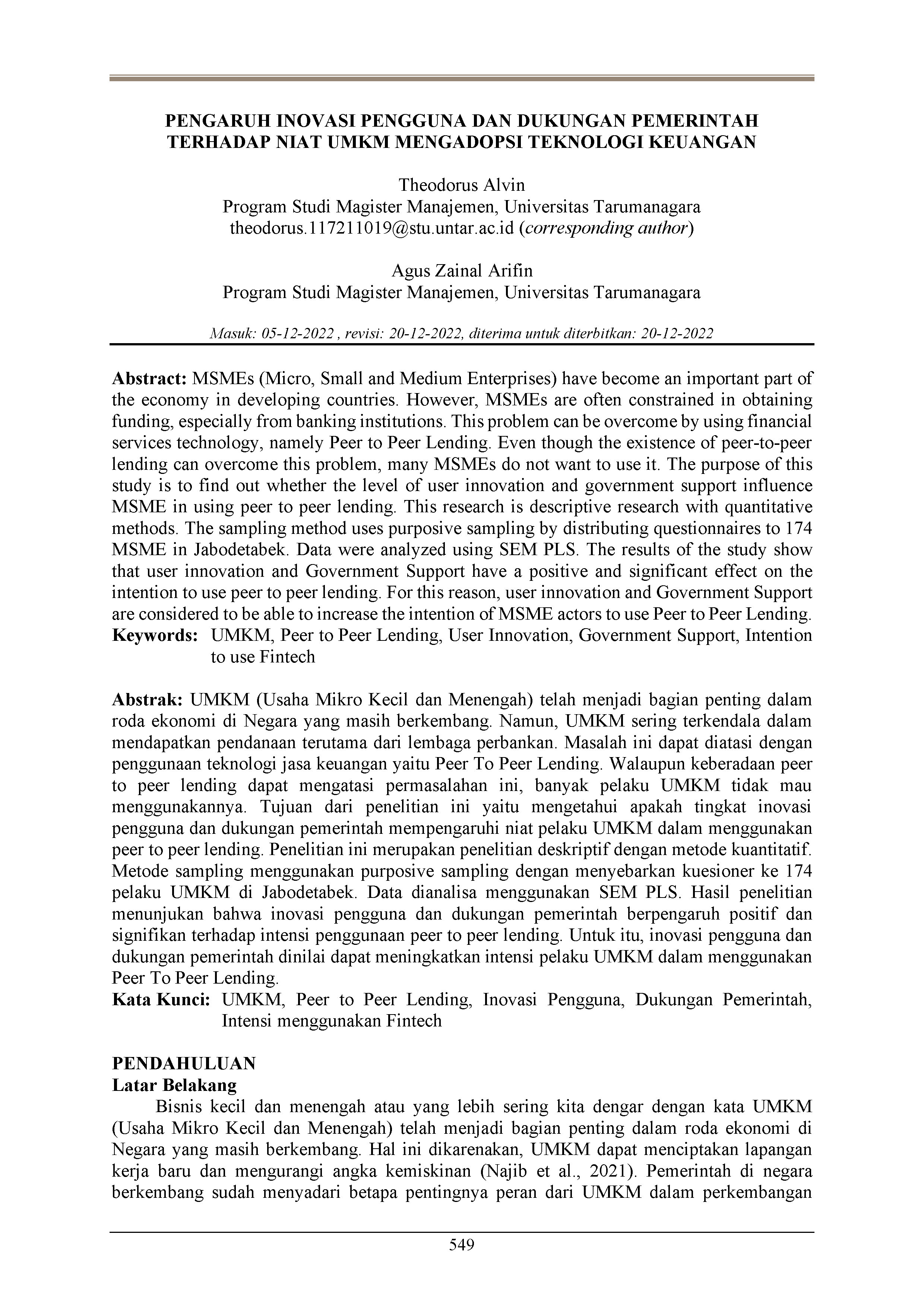Pengaruh inovasi pengguna dan dukungan pemerintah terhadap niat UMKM mengadopsi teknologi keuangan
Main Article Content
Abstract
MSMEs (Micro, Small and Medium Enterprises) have become an important part of the economy in developing countries. However, MSMEs are often constrained in obtaining funding, especially from banking institutions. This problem can be overcome by using financial services technology, namely Peer to Peer Lending. Even though the existence of peer-to-peer lending can overcome this problem, many MSMEs do not want to use it. The purpose of this study is to find out whether the level of user innovation and government support influence MSME in using peer to peer lending. This research is descriptive research with quantitative methods. The sampling method uses purposive sampling by distributing questionnaires to 174 MSME in Jabodetabek. Data were analyzed using SEM PLS. The results of the study show that user innovation and Government Support have a positive and significant effect on the intention to use peer to peer lending. For this reason, user innovation and Government Support are considered to be able to increase the intention of MSME actors to use Peer to Peer Lending.
UMKM (Usaha Mikro Kecil dan Menengah) telah menjadi bagian penting dalam roda ekonomi di Negara yang masih berkembang. Namun, UMKM sering terkendala dalam mendapatkan pendanaan terutama dari lembaga perbankan. Masalah ini dapat diatasi dengan penggunaan teknologi jasa keuangan yaitu Peer To Peer Lending. Walaupun keberadaan peer to peer lending dapat mengatasi permasalahan ini, banyak pelaku UMKM tidak mau menggunakannya. Tujuan dari penelitian ini yaitu mengetahui apakah tingkat inovasi pengguna dan dukungan pemerintah mempengaruhi niat pelaku UMKM dalam menggunakan peer to peer lending. Penelitian ini merupakan penelitian deskriptif dengan metode kuantitatif. Metode sampling menggunakan purposive sampling dengan menyebarkan kuesioner ke 174 pelaku UMKM di Jabodetabek. Data dianalisa menggunakan SEM PLS. Hasil penelitian menunjukan bahwa inovasi pengguna dan dukungan pemerintah berpengaruh positif dan signifikan terhadap intensi penggunaan peer to peer lending. Untuk itu, inovasi pengguna dan dukungan pemerintah dinilai dapat meningkatkan intensi pelaku UMKM dalam menggunakan Peer To Peer Lending.
Article Details

This work is licensed under a Creative Commons Attribution-NonCommercial-ShareAlike 4.0 International License.
This work is licensed under a Jurnal Manajemen Bisnis dan Kewirausahaan Creative Commons Attribution-ShareAlike 4.0 International License.
References
Abadli, R., Kooli, C., & Otmani, A. (2020). Entrepreneurial culture and promotion of exporting in Algerian SMEs: perception, reality and challenges. International Journal of Entrepreneurship and Small Business, 41(2), 227–240. https://doi.org/10.1504/IJESB.2020.109933
Agarwal, R., & Prasad, J. (1998). A Conceptual and Operational Definition of Personal Innovativeness in the Domain of Information Technology. Information Systems Research, 9(2), 204–215. http://www.jstor.org/stable/23010927
Burn, J. M. (1995). The New Cultural Revolution: The Impact of EDI on Asia. Journal of Global Information Management, 3, 16–23.
Chong, A. Y. L., Ooi, K. B., Lin, B., & Tan, B. I. (2010). Online banking adoption: An empirical analysis. International Journal of Bank Marketing, 28(4), 267–287. https://doi.org/10.1108/02652321011054963
Coffie, C. P. K., Hongjiang, Z., Mensah, I. A., Kiconco, R., & Simon, A. E. O. (2021). Determinants of FinTech payment services diffusion by SMEs in Sub-Saharan Africa: evidence from Ghana. Information Technology for Development, 27(3), 539–560. https://doi.org/10.1080/02681102.2020.1840324
Davis, F. (1985). A Technology Acceptance Model for Empirically Testing New End-User Information Systems.
Disemadi, H. S., Yusro, M. A., & Balqis, W. G. (2020). The Problems of Consumer Protection in Fintech Peer To Peer Lending Business Activities in Indonesia. Sociological Jurisprudence Journal, 3(2), 91–97. https://doi.org/10.22225/scj.3.2.1798.91-97
Ghozali, I. (2020). 25 Grand Theory. Yoga Pratama.
Hair, J. F., Ringle, C. M., & Sarstedt, M. (2011). PLS-SEM : Indeed a Silver Bullet. Journal of Marketing Theory and Practice, 19(2), 139–152. https://doi.org/10.2753/MTP1069-6679190202
Hu, G., Yan, J., Pan, W., Chohan, S. R., & Liu, L. (2019). The Influence of Public Engaging Intention on Value Co-Creation of E-Government Services. IEEE Access, 7, 111145–111159.
Jeyaraj, A., Rottman, J. W., & Lacity, M. C. (2006). A review of the predictors, linkages, and biases in IT innovation adoption research. Journal of Information Technology, 21(1), 1–23. https://doi.org/10.1057/palgrave.jit.2000056
Najib, M., Ermawati, W. J., Fahma, F., Endri, E., & Suhartanto, D. (2021). Fintech in the small food business and its relation with open innovation. Journal of Open Innovation: Technology, Market, and Complexity, 7(1). https://doi.org/10.3390/joitmc7010088
Otoritas Jasa Keuangan. (2016). Peraturan Otoritas Jasa Keuangan Nomor: 77 /POJK.01/2016 TENTANG LAYANAN PINJAM MEMINJAM UANG BERBASIS TEKNOLOGI INFORMASI. Otoritas Jasa Keuangan, 1–29. https://www.ojk.go.id/id/regulasi/otoritas-jasa-keuangan/peraturan-ojk/Documents/Pages/POJK-Nomor-77-POJK.01-2016/SAL - POJK Fintech.pdf
Rogers, E. M. (1962). Diffusion of Innovations. Free Press of Glencoe. https://books.google.co.id/books?id=zw0-AAAAIAAJ
Rosavina, M., Rahadi, R. A., Kitri, M. L., Nuraeni, S., & Mayangsari, L. (2019). P2P lending adoption by SMEs in Indonesia. Qualitative Research in Financial Markets, 11(2), 260–279. https://doi.org/10.1108/QRFM-09-2018-0103
Sukkar, A., & Hasan, H. (2005). Toward a model for the acceptance of Internet banking in developing countries. Information Technology for Development, 11, 381–398. https://doi.org/10.1002/itdj.20026
Tan, M., & Teo, T. S. H. (2000). Factors Influencing the Adoption of Internet Banking. Journal of the Association for Information Systems, 1(1), 1–44.


